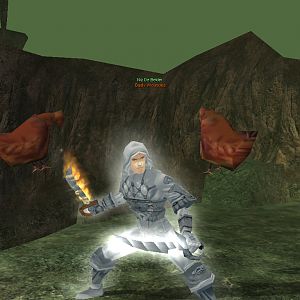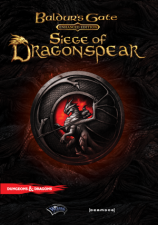-

- Forums
- Chatrooms
- Gallery
- Gameplay Videos
- Upload
- Articles
- Mod Reviews
- Shop SP: Games, Movies, Books

|
|
A VIDEO BASED WALKTHROUGH TO WIZARDRY 8
This is the final instalment of the Dark Savant trilogy. Each game can be played individually without prior exposure to the others, but playing the complete trilogy from start to finish can be a rewarding experience.
For additional insights and information on playing Wizardry 8, I earnestly recommend checking out Flamestryke's site. This site is loaded with little nuggets of information and advice that can help. And indeed, much of what you'll see is putting those concepts into action, although I do have a few ideas of my own.
This time, I made my own maps. The one exception is for the Retro Dungeons, but that's because the auto-map feature is useless for figuring out where you are when you're in one of the Retro Dungeons. This walkthrough thus uses Flamestryke's Retro Dungeon maps instead.
Party Creation
The fundamental first step in any such role-playing game of course is to plan an effective party. If you plan on playing the complete trilogy, extra planning is involved if you want to create characters that will be effective in all three games.
Pure Spell Casters - Pure spellcasters are characters who devote themselves exclusively to one spellbook as their specialization. The four choices are Priest, Mage, Alchemist, and Psionicist. Pure spellcasters tend to get more mana, and recover their mana much more quickly through resting, in comparison to hybrid characters (e.g. Lord, Samurai, etc.), making your choice of pure spellcasters an important one.
Psionicists sound really cool, but their utility is limited. They can heal some things, but don't match up to Priests in that regard. Their key appeal is spells like Psionic Blast and Mind Flay that can both damage monsters and render them insane, a condition that can either prevent monsters from attacking or even cause them to attack each other. When these spells wreak havoc on their targets, it is indeed quite fun. The problem is, the kind of monsters this will work on is quite limited. Monsters that lack minds (e.g. slimes, undead) or monsters with strong mental resistance (e.g. demons) don't respond to such spells in the way you'd hope. A Psionicist can of course use spells that use other elemental sources of damage, but these are inferior in comparison to the raw damage that a Mage or a Bishop can inflict.
Alchemists are a similar deal. They have some healing ability, and some sources of offensive damage, but both are inferior in comparison to the Priest and the Mage respectively.
This is not to say that there is no merit to their spellbooks. The Alchemist for example has some nice cloud-type spells that can cause lingering damage over the long haul.
But this leads to ...
The Bishop - The Bishop is revamped in Wizardry 8, and can now learn any spell in the game. Of course, this can slow down the Bishop's learning and mastery process, but there's a way to circumvent this.
Also ...
Hybrid Characters - Hybrid characters are basically characters who can combine casting spells with either fighting (e.g. Samurai, Lord, Valkyrie, Monk) or thieving (e.g. Ranger, Ninja). I like these kind of characters for a number of reasons.
You get more options than you would with a vanilla Fighter or Thief. Sometimes your Priest or Mage may want to cast a spell in a certain situation, but finds the situation so pressing that another spell is needed even more. Unfortunately, a character can only cast one spell each round. This is where having a hybrid is helpful. Now you can cast both spells now that your hybrid is there to provide the second spell, which would not be the case with a vanilla Fighter or Thief.
Also, sometimes it is helpful to be able to have more than character who can cast the same spell. For example, you may be faced with demons or undead that can sustain a lot of damage and are quite dangerous. Multiple castings of the Banish spell can prove quite helpful then. You may want more healing power to increase your party's durability, and so on.
On the other hand, sometimes hybrid characters can learn spells that the pure spellcasters can't get around to adding to their spell books, and this leads to more versatility.
The hybrid spellcaster can also provide spellbooks that your pure spellcasters may not provide. For example, the Psionics spellbook is useful in some situations, but those situations are limited. Psionic Blast is helpful against some monsters, but not others. This makes the Monk an ideal addition to a party. The Monk can sometimes draw upon Psionic spells in those limited situations that call for it. But when Psionic spells may not be the best thing for other situations, the Monk can simply revert to fighting with his bare hands and feet.
Why I don't like the Lord - The Valkyrie does everything that a Lord does, and needs less experience to do it. The Valkyrie can use the Diamond Ring during Wizardry 7, but the Lord can't. During Wizardry 8, each has different unique powers. The Lord regenerates health. The Valkyrie can cheat death, avoid dying after attacks that bring her health to zero, AND can attain health regeneration through items found in the game. Go with a Valkyrie throughout the trilogy.
Why I don't like the Samurai - Sure, a katana-wielding Samurai that can cast offensive spells just has to sound cool, doesn't it? The problem is, while the Samurai can wear decent body and leg armor, he can only wear pitiful Cuir Gauntlets over the hands, Buskins over the feet, and a Kabuto helm over the head. Attacks are admittedly more frequently aimed at the body and legs of the Samurai. But when attacks do go for the head, hands, or feet, it can really hurt. This is especially the case for the higher-level monsters. This holds true through to Wizardry 8. At least somebody like a Valkyrie can wear top-notch armor over all body parts.
Why I don't like the Ranger - The Ranger just does not have the armor and weapon choices to justify him being a front rank character. The ranger can of course use arrows and Alchemy spells from the back rank, and can now critically hit more often with his arrows during Wizardry 8, but it's just not enough for me. By the time I reach Wizardry 8, the Bard can start to imitate the Ranger, but perhaps not quite to the same degree, and can use the Bard instruments to boot.
For anyone who's interested in the details, my party members were:
Also, I've provided some guidelines on Character Development and Combat.
And now that my party has been created, it is time to start the game itself in the Lower Monastery.
I’ve submitted past guides to Sorcerer’s Place as Dave Milward. My alias here, however, is Beren. If there’s anything you’d like to share with me, by all means you’re welcome to send me an e-mail to beren or contact me via PM on the SP message boards. If I find anything particularly helpful and worth mentioning specifically, I’ll give credit where credit is due in updates.
or contact me via PM on the SP message boards. If I find anything particularly helpful and worth mentioning specifically, I’ll give credit where credit is due in updates.
Implemented in .PHP format by Montresor.
This guide may not be reproduced, in whole or in part, without the express written permission of the author and of Sorcerer's Place.


